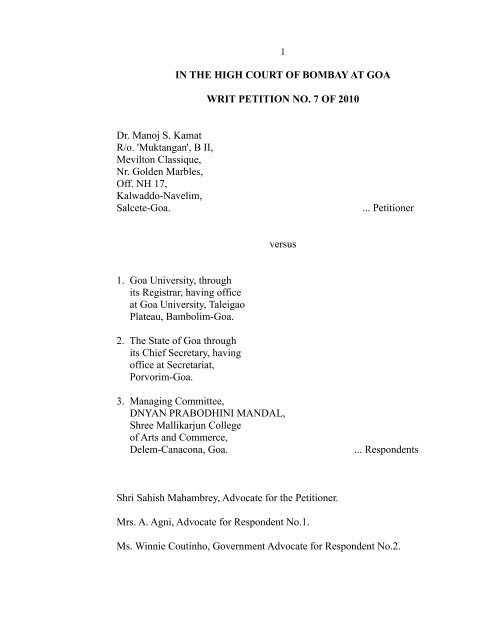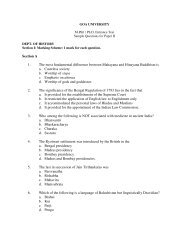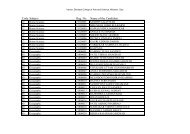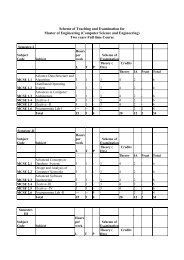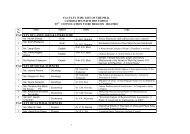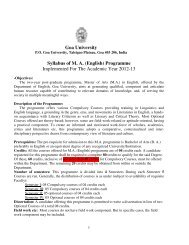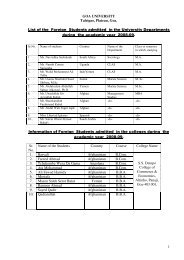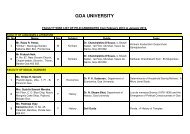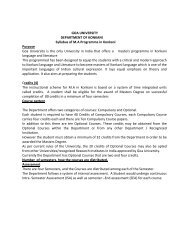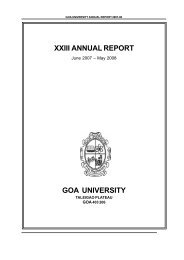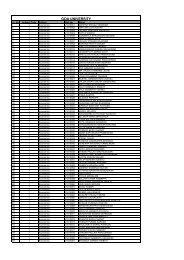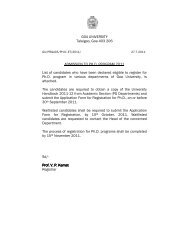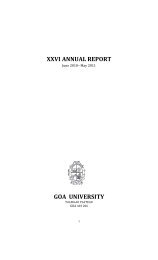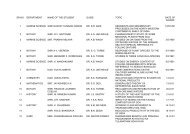Dr. Manoj S. Kamat v/s Goa University
Dr. Manoj S. Kamat v/s Goa University
Dr. Manoj S. Kamat v/s Goa University
Create successful ePaper yourself
Turn your PDF publications into a flip-book with our unique Google optimized e-Paper software.
1<br />
IN THE HIGH COURT OF BOMBAY AT GOA<br />
WRIT PETITION NO. 7 OF 2010<br />
<strong>Dr</strong>. <strong>Manoj</strong> S. <strong>Kamat</strong><br />
R/o. 'Muktangan', B II,<br />
Mevilton Classique,<br />
Nr. Golden Marbles,<br />
Off. NH 17,<br />
Kalwaddo-Navelim,<br />
Salcete-<strong>Goa</strong>. ... Petitioner<br />
1. <strong>Goa</strong> <strong>University</strong>, through<br />
its Registrar, having office<br />
at <strong>Goa</strong> <strong>University</strong>, Taleigao<br />
Plateau, Bambolim-<strong>Goa</strong>.<br />
2. The State of <strong>Goa</strong> through<br />
its Chief Secretary, having<br />
office at Secretariat,<br />
Porvorim-<strong>Goa</strong>.<br />
versus<br />
3. Managing Committee,<br />
DNYAN PRABODHINI MANDAL,<br />
Shree Mallikarjun College<br />
of Arts and Commerce,<br />
Delem-Canacona, <strong>Goa</strong>. ... Respondents<br />
Shri Sahish Mahambrey, Advocate for the Petitioner.<br />
Mrs. A. Agni, Advocate for Respondent No.1.<br />
Ms. Winnie Coutinho, Government Advocate for Respondent No.2.
ORAL JUDGMENT(Per N. A. BRITTO, J.)<br />
2<br />
Rule. By consent heard forthwith.<br />
CORAM : NARESH H. PATIL &<br />
N. A. BRITTO, JJ.<br />
DATE : 3RD MARCH, 2010<br />
2. Challenge in this Writ Petition is to the refusal to grant approval<br />
by the <strong>Goa</strong> <strong>University</strong>(Respondent No.1) for the appointment of the Petitioner<br />
to the post of Principal(Reader's grade) of the College managed by Respondent<br />
No.3, conveyed to the College by undated letter of October, 2009. The said<br />
approval was required to be given in terms of Statute SC-5(2)(d) of the<br />
Statutes of the <strong>University</strong> which provides that the recommendations of the<br />
Selection Committee shall be subject to the approval of the Vice-Chancellor.<br />
The <strong>University</strong> has not given its approval for the appointment of the Petitioner<br />
as Principal of the said College, as in the opinion of the Vice-Chancellor, the<br />
services rendered by the Petitioner for the period from June, 1999 to<br />
December, 1999 on lecture basis cannot be counted for the purpose of 10 years<br />
experience.<br />
3. Some more facts necessary to decide the controversy need be<br />
stated:<br />
The College advertised for the filling of the post of
3<br />
Principal(Readers' Grade). As per the advertisement as well as SA-19(vii)(b),<br />
the eligibility criteria was as follows:-<br />
(b) Principals(Readers' Grade)<br />
1. A Masters' Degree with at<br />
least 55% marks or its equivalent<br />
grade of B in the 7 point scale with<br />
latter grades 0, A, B, C, D, E & F<br />
2. Ph.D or equivalent qualification<br />
3. Total experience of 10<br />
years of teaching/Research in<br />
Universities/Colleges and other<br />
institution of higher education<br />
4. The Petitioner applied for the said post of Principal(Readers'<br />
Grade) by his application dated 18-6-1999. A duly constituted Selection<br />
Committee which had two nominees of the Vice-Chancellor and two experts<br />
appointed by the <strong>Goa</strong> <strong>University</strong> considered the names of four candidates and<br />
shortlisted two of them including the Petitioner and recommended the<br />
appointment of the Petitioner for the said post of Principal. This was done<br />
after considering their qualifications, teaching and research experience,<br />
publications, etc. The College informed the Petitioner by their letter dated<br />
9-9-2009 that he was selected for the post of Principal of their College, and<br />
further informed him that a formal order will be issued to him after being<br />
approved by the <strong>University</strong> and the Government of <strong>Goa</strong>.
4<br />
5. As already stated, the <strong>University</strong> vide their undated letter of<br />
October, 2009 informed the College that the services rendered by the<br />
Petitioner for the period from June, 1999 to December, 1999 on lecture basis<br />
could not be considered, and, therefore the Petitioner was not eligible for the<br />
post of Principal, and, therefore no approval could be given. The Petitioner<br />
was informed by the College about the same vide their letter dated<br />
31-10-2009. The Petitioner appears to have represented to the College and also<br />
to the Vice-Chancellor but the Petitioner's request for appointment was again<br />
turned down by the <strong>University</strong>.<br />
6. The <strong>University</strong> has filed their affidavit-in-reply through its<br />
Registrar, and in the said reply, it is contended that the total experience of 10<br />
years of teaching and research in a College and other institutions of higher<br />
education refers either to total experience of teaching itself or total experience<br />
of research itself or experience of teaching and research taken together. It is<br />
stated that the Petitioner did not meet all the qualifications and experience as<br />
per the advertisement for the post of Principal and SA-19(vii) of the Statutes<br />
of the <strong>Goa</strong> <strong>University</strong> and also UGC guidelines prescribing minimum<br />
qualifications and experience for the appointment to the post of Principal. It is<br />
denied that the decision of the <strong>University</strong> to reject the approval for the<br />
appointment of the Petitioner is unjust, perverse and arbitrary. It is stated that<br />
although there were nominees of the <strong>Goa</strong> <strong>University</strong> on the Selection
5<br />
Committee that would not take away the power of the <strong>Goa</strong> <strong>University</strong> to<br />
refuse approval in case the <strong>University</strong> finds that the approval cannot be given<br />
in terms of its Statutes. It is further stated that SA-19 which refers to total<br />
experience of research and teaching cannot be equated to or include teaching<br />
on lecture basis, and if such an interpretation is given, even experience of part<br />
time teacher for some months with break in between over a large period of<br />
time would also qualify which is not the mandate of the Statute. It is stated<br />
that the post of a Principal is a very responsible post and he is expected to be<br />
at the helm of affairs, guide the teachers, and, therefore the post requires that<br />
there must be experience of teaching which is interpreted by the <strong>University</strong> to<br />
mean teaching in terms of workload as specified in the Statutes of the<br />
<strong>University</strong>.<br />
7. It is stated that a uniform interpretation has been applied by the<br />
<strong>Goa</strong> <strong>University</strong> while considering the condition as to experience in teaching<br />
that teaching on lecture basis cannot be taken into consideration while<br />
computing total experience from teaching of a candidate. It is further stated<br />
that the research experience acquired during the period spent for obtaining the<br />
Research Degree is required to be deducted while computing the total research<br />
experience of the candidate, and that in the entire petition, the Petitioner has<br />
not been able to specify the actual period spent by him in doing research. It is<br />
further stated that during the period the Petitioner was engaged in teaching, if
6<br />
some projects are handled by him, he cannot contend that the same should be<br />
treated or considered separately in addition to teaching experience as it is the<br />
research during the same period which the Petitioner wants to be considered as<br />
his teaching experience. It is stated that the workload contemplated by the<br />
Statutes of the <strong>University</strong> is 40 clock hours per week. It is denied that the<br />
services rendered by the Petitioner during June, 1999 to December, 1999 were<br />
regular full time service and mere signing of a muster roll or teaching, like a<br />
regular full time college teacher would not mean that the workload of a<br />
teacher on lecture basis is the same as that of a regular college teacher. It is<br />
also stated that no details have been furnished about the research experience in<br />
completing and presenting research papers and projects, and, in any event, it<br />
is stated that the research projects are done or papers are published during the<br />
same span of time which the Petitioner wants to be considered as his teaching<br />
experience but the same cannot be computed twice for the purpose of<br />
considering the total experience of the teacher. It is stated that the teaching<br />
experience has to be understood in the light of other provisions of Statute<br />
SA-19 of the Statutes with reference to workload referred to herein above. It is<br />
further stated that the workload of a teacher who is working on lecture basis<br />
cannot be compared to the teacher who renders complete workload in terms of<br />
Statute SC-5, and, it is further stated that in terms of advertisement dated<br />
3-6-2009 by which time the Petitioner had not completed the total teaching<br />
experience as required and the teaching experience contemplated under Statute
7<br />
SA-19 is the post-acquisition of qualifications as a lecturer. It is stated that the<br />
Petitioner passed M.Com on 10-7-1999 and the experience which the<br />
Petitioner wants to be taken into consideration by the <strong>University</strong> is the<br />
experience from 1-6-1999, and, therefore by no stretch of imagination even<br />
assuming but not admitting that the total experience would also encompass<br />
teaching on lecture basis on the date of filing of the application the Petitioner<br />
did not have total experience of 10 years and at the highest his experience post<br />
10-7-1999 only could be taken into consideration and this on the assumption<br />
that the teaching on lecture basis is to be taken into consideration as part of<br />
total teaching experience, and, therefore the Petitioner could not be stated to<br />
have put in 10 years experience as on 18-6-2009. It is also stated that the<br />
Petitioner also submitted a declaration stating that he had rendered service<br />
comprising of 21 lectures of 45 minutes duration including the workload of<br />
guiding two T.Y. B.Com projects, and, it was the contention of the Petitioner<br />
that this was as good as workload of a full time college teacher but the said<br />
contention of the Petitioner is absolutely incorrect because in terms of Statute<br />
SC-5 the workload of a teacher is 40 clock hours which cannot be compared to<br />
teaching on lecture basis of 45 minutes duration. It is stated that the workload<br />
of a person on lecture basis would be less than half as compared to the<br />
workload of a teacher in terms of Statute SC-5. The Research experience of<br />
Ph.D was during the teaching tenure and there is no independent research<br />
carried on by the Petitioner.
8. The Petitioner has not filed any affidavit in rejoinder.<br />
8<br />
9. We have heard Shri S. Mahambrey and Mrs. A. Agni, learned<br />
Counsel on behalf of the Petitioner and <strong>Goa</strong> <strong>University</strong>/Respondent No.1. The<br />
representative of the College has only lamented that the College is without a<br />
Principal for quite some time now.<br />
10. Shri S. Mahambrey, learned Counsel appearing on behalf of the<br />
Petitioner submits that the Statutes nowhere say that the experience of 10<br />
years has to be on a regular basis. Learned Counsel next submits that the<br />
Petitioner was selected after an interview by a duly constituted Selection<br />
Committee, and to such a selected candidate, the <strong>University</strong> ought to have<br />
granted its approval, and in support of this submission, learned Counsel has<br />
placed reliance on a decision of the Apex Court in the case of <strong>Dr</strong>. Kumar Bar<br />
Das v. Utkal <strong>University</strong> and others((1999) 1 SCC 453). Learned Counsel<br />
further submits that SA-19(vii)(b)(3) does not state that lecture basis teaching<br />
does not fall within the ambit of “total teaching experience” inasmuch as the<br />
UGC Notification also does not explicitly state that teaching on lecture basis<br />
cannot be considered in computing the “total teaching experience of 10 years”.<br />
Learned Counsel further submits that the Research experience garnered by the<br />
Petitioner after obtaining his Ph.D, in completing, presenting and publishing
9<br />
research papers and projects has been excluded by the <strong>University</strong> and which<br />
shows that their action is illegal and arbitrary.<br />
11. On the other hand, Mrs. Agni, learned Counsel on behalf of the<br />
<strong>Goa</strong> <strong>University</strong>, has made her submissions in the light of the reply filed on<br />
behalf of the <strong>University</strong>. Learned Counsel has submitted that the <strong>University</strong><br />
has been interpreting the said provision in all cases in a manner set out in the<br />
affidavit-in-reply. It is further submitted that the Petitioner did not have<br />
10 years teaching experience on the date of application i.e. 18-6-1999 even<br />
assuming that the teaching experience on lecture basis could otherwise be<br />
counted for the purpose of computing the total experience of the Petitioner.<br />
Mrs. Agni has also submitted that there is no averment in the petition that the<br />
Petitioner worked for 10 years and that the same period spent on teaching<br />
cannot be considered separately as period spent on research. Reference is<br />
made to Statute SA-19(xii) which deals with counting of past service for the<br />
appointment of a Professor and it is submitted that in terms of sub-clause<br />
(vi) of SA-19(xii) any appointment on ad hoc basis or in a leave vacancy<br />
of less than one year duration is not counted for the purpose of computing<br />
5 years service. Learned Counsel has placed reliance on the decision<br />
of the Apex Court in G. N. Nayak v. <strong>Goa</strong> <strong>University</strong> and others<br />
((2002) 2 SCC 712) wherein the Apex Court has stated as follows:-
10<br />
“27. That a candidate can club together<br />
his qualifications of teaching and<br />
research to cover the 10 years' period as<br />
has been held in Kumar Bar Das(<strong>Dr</strong>.)<br />
v. Utkal <strong>University</strong>. The question still<br />
remains, would any kind of research at a<br />
<strong>University</strong> do? Strictly speaking and as a<br />
matter of legal interpretation, the phrase<br />
“research at the <strong>University</strong>/national level<br />
institution” should be read ejusdem<br />
generis and in the context of the<br />
alternate qualifications specified i.e.<br />
“teaching experience” and the last<br />
phrase “including experience of guiding<br />
research at doctoral level”. In other<br />
words, the research must be independent<br />
such that the researcher could guide<br />
others aspiring for Doctorate degrees<br />
and not the research where the<br />
researcher is striving for a Doctorate<br />
degree himself. The appellant's research<br />
prior to 17-9-1986 was pre-doctoral.<br />
Consequently and according to the letter<br />
of law, perhaps the appellant was not<br />
qualified to be considered as a candidate<br />
for a Professorship in 1996 since he had<br />
failed to meet the criteria by about four<br />
months”.<br />
“28. However, the Court would not<br />
be justified in adopting a legalistic<br />
approach and proceed on a technical<br />
view of the matter without considering<br />
the intention of the <strong>University</strong> in laying<br />
down the condition of eligibility, since it<br />
is for the <strong>University</strong> to decide what kind<br />
of research would be adequate to qualify<br />
for professorship. The <strong>University</strong> had<br />
intended, understood and consistently<br />
proceeded on the basis that the predoctoral<br />
research could be counted<br />
towards the 10 years' experience clause.<br />
So did Respondent No.5. When<br />
Respondent No.5 applied for the post
11<br />
when it was advertised in 1994 he did<br />
not have 10 years' cumulative<br />
experience of teaching and post-doctoral<br />
research. Since he had obtained a<br />
Doctorate degree in November 1985, the<br />
<strong>University</strong> also considered his<br />
application and called him for an<br />
interview in September 1985, though<br />
according to a strict interpretation of the<br />
eligibility criteria Respondent No.5 was<br />
not qualified. Finally in <strong>Dr</strong>. Kumar Bar<br />
Das v. Ultal <strong>University</strong> this Court in<br />
construing similar eligibility criteria has<br />
held at page 458 that the research<br />
required could include pre-doctoral<br />
research experience”.<br />
12. In our view, the stand taken by the <strong>University</strong> is reasonable and<br />
in accordance with the Statutes of the <strong>University</strong>. In fact the Petitioner has not<br />
controverted the stand taken by the <strong>University</strong>. If, according to the Petitioner<br />
Statute 19(vii)(b)(3) does not say that lecture basis experience cannot be added<br />
for the purpose of computing total experience of 10 years, it also does not say<br />
that it should be added. The <strong>University</strong> has understood and consistently<br />
proceeded on the basis that such experience ought to be excluded and in that<br />
the <strong>University</strong>'s decision cannot be faulted.<br />
13. The case of <strong>Dr</strong>. Kumar Bar Das v. Utkal <strong>University</strong> and<br />
others(supra) stood on its own facts. The eligibility requirement there was<br />
“about ten years of experience of teaching and/or research and experience of
12<br />
guiding at doctoral level”. <strong>Dr</strong>. Kumar Bar Das(appellant therein) was found<br />
to have held teaching experience of 7 years, 7 months and 14 days, and<br />
research experience of 1 year, 5 months and 14 days, and in all, 9 years,<br />
26 days and the Selection Committee gave him 4 marks out of 10 on that<br />
score, a decision which was approved by the Syndicate of the <strong>University</strong> but<br />
was upset by the Vice-Chancellor, and, in this context, the Apex Court<br />
observed that the Vice-Chancellor cannot normally interfere with the<br />
substantive assessment of merit of candidates made by an expert body unless<br />
mala fides or other collateral reasons are shown. The Apex Court referred to<br />
the case of Neelima Misra v. Harinder Kaur Paintal((1999) 2 SCC 746)<br />
with reference to the powers of the Chancellors in matters of appointment of<br />
Professors/Readers and held that it was purely an administrative function and<br />
not quasi judicial. Indeed, it was observed in Neelima Misra v. Harinder<br />
Kaur Paintal(supra) that:<br />
“The Chancellor, however, has to act<br />
properly for the purpose for which the<br />
power is conferred. He must take a<br />
decision in accordance with the<br />
provisions of the Act and the statutes. He<br />
must not be guided by extraneous or<br />
irrelevant considerations. He must not<br />
act illegally, irrationally or arbitrarily.<br />
Any such illegal, irrational or arbitrary<br />
action or decision, ... is liable to be<br />
quashed being violative of Article 14 of<br />
the Constitution of India”.
13<br />
14. As per Statute SA-5(xix) the overall workload of a full time<br />
College teacher has got to be 40 clock hours per week, and, out of 40 clock<br />
hours, the teacher is expected to put in work of 30 clock hours per week on the<br />
college premises; of the 30 clock hours the classroom instruction work should<br />
be for 16 hours in case of lecturers/Senior lecturers/Lecturers(Selection Grade)<br />
and 14 hours in the case of Readers, and shall consist of 18 lectures each of 45<br />
minutes duration and three or one tutorial(as the case may be) each of 45<br />
minutes duration, per week. In the case of subjects where tutorials are not<br />
prescribed, the Principal shall assign extra classes to teachers in such subjects<br />
for coaching students who are weak in their subjects and/or intensive training<br />
of students. The remaining 14 hours on the premises shall be spent by a full<br />
time teacher on guidance, consultation by students, curricular and extra-<br />
curricular activities, administration and professional work, etc. The Principal<br />
is required to work out the staffing pattern of college teacher on the basis of<br />
the above norms.<br />
15. It is not the case of the Petitioner that while he was teaching in<br />
different colleges from 1-6-1999 to December, 1999 on lecture basis, he had<br />
put in a workload of 40 clock hours. It appears that for first 1 ½ months of the<br />
said period the Petitioner worked for Sindhdurga, Education Society,<br />
Mumbai, and for the next 5 ½ months the Petitioner worked for Murgao<br />
Education Society at <strong>Goa</strong> and it is not the case of the Petitioner that during the
14<br />
said period he had put in 40 clock hours of work per week. According to the<br />
Petitioner himself, he had put in a workload of about 21 lectures of 45 minutes<br />
duration which certainly does not work out even to half of the workload which<br />
was required of him as full time college teacher. The Petitioner's explanation is<br />
that although he did not put in 40 clock hours per week he was all the time<br />
available in the college premises during working hours, which explanation has<br />
not been accepted by the <strong>University</strong>, and in our opinion, rightly.<br />
Admittedly, and as stated on behalf of the <strong>University</strong>, the Petitioner as on<br />
the date of application also did not have qualifying service of 10 years of<br />
teaching/research experience in the Colleges or Universities, which was an<br />
essential eligibility criteria for the appointment to the post of the<br />
Principal(Readers' Grade). The research experience, which the Petitioner<br />
claims was not considered is also the experience, if at all, gained by the<br />
Petitioner during the time he was teaching and therefore could not be<br />
computed separately. Moreover, it is stated by the <strong>University</strong> that the<br />
Petitioner passed his M.Com only on 10-7-1999 and any experience to be<br />
counted could not be counted from 1-6-1999. These aspects were not at all<br />
considered by the Selection Committee but have been considered by the<br />
<strong>University</strong> at the time of declining its approval to the appointment of the<br />
Petitioner. It has also been stated on behalf of the <strong>University</strong> that they have<br />
given a uniform and consistent interpretation in all cases whilst considering<br />
the condition of experience in teaching, that teaching on lecture basis cannot
15<br />
be taken into consideration while computing total experience of teaching of a<br />
candidate. As already stated it may be that the Statute itself does not provide<br />
that the teaching experience on lecture basis is to be excluded but neither it<br />
provides that it is to be included and the fact remains that the <strong>University</strong> has<br />
considered the said provision of Statute 19(vii) as excluding experience gained<br />
on lecture basis and that too which is not 40 clock hours per week.<br />
16. We find that the stand taken by the <strong>University</strong> that total<br />
experience of 10 years has to be computed post qualification and on the basis<br />
of 40 clock hours per week is both reasonable, and in accordance with the<br />
Statutes, and, therefore calls for no interference of this Court in writ<br />
jurisdiction.<br />
17. We, therefore, dismiss the petition. Rule discharged with no<br />
order as to costs.<br />
RD<br />
NARESH H. PATIL, J.<br />
N. A. BRITTO, J.


